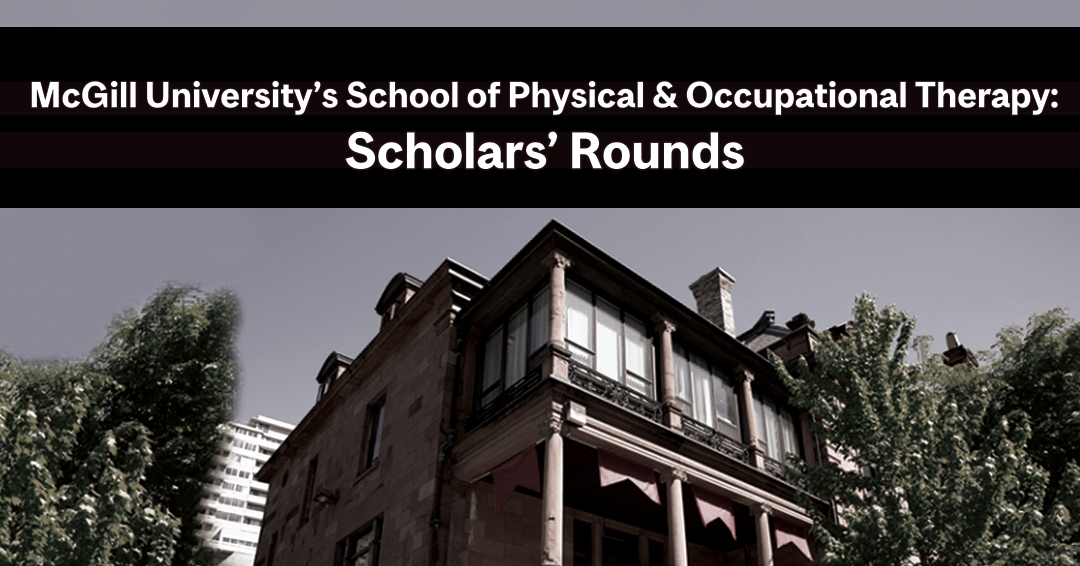“We are not simply educators; we are role models. How we go through this process, ourselves, teaches someone else and either perpetuates the system, or helps to disrupt and dismantle it.”
Dr. Tracy Blake PT
McGill University’s School of Physical & Occupational Therapy (SPOT) recently launched a new series consisting of four scholarly presentations, SPOT’s Scholars’ Rounds, intended to contribute to addressing the problems of racism and inequity in health care pedagogy. In reaction to the events of the spring of 2020, including but not limited to the deaths of Breonna Taylor (March 13) and George Floyd (May 25), SPOT has initiated this examination into systemic racism as it exists in health care, in Canada. Under the direction of Co-Chairs of the Healthy SPOT Committee, Marie-Lyne Grenier, OT, MSc and Sarah Marshall, PT, MSc, this initiative is supported by SPOT’s leadership, Director and Associate Dean, Dr. Laurie Snider, and SPOT’s Directors’ Council.
This is an ideal time for the professionals and academics in health care to take a critical look at the pedagogical practices that occur in our own domain. As outlined in McGill’s new 5-year anti-racism action plan, one concrete way that units can work towards anti-colonial, anti-racist and anti-oppressive educational practices is through constructive dialogue and problem-solving guided by experts. It is incumbent on us to build capacity to deliver anti-oppressive and anti-racist curricula that encourage critical thinking for faculty, staff, and students on questions of race and systemic oppression in health care. When addressed appropriately, this can be an opportunity to recognize and put into action anti-oppressive teaching practices. In the words of McGill University’s Principal, Suzanne Fortier, “Working together, we can ensure that McGill University’s third century continues to be defined by sustained excellence as well as inclusiveness and equity.”1
What follows is a summary of the first of the series of four Scholars’ Rounds.
The inaugural speaker in this series was Tracy Blake, PT, PhD. Dr. Blake is a physiotherapist working in acute care in Toronto. A clinician-scientist, Dr. Blake’s research interests are focused on the way themes of population health, health equity and person-centered care contribute and impact the health of the communities that she serves.
Speaking to physical and occupational therapy faculty, staff, and students, Dr. Blake began her presentation stating that her aim was to speak about racial injustice in a manner that prioritizes transparency, clarity and safety over comfort. Examining how we account for, and are held accountable for racism, white supremacy and colonialism within our professions, our organizations and ourselves is the key to moving forward.
Dr. Blake explained privilege and oppression as being like two sides of one coin. Referencing the works of Canadian equity researcher, Dr. Stephanie Nixon, PT, PhD, and the Coin Model of Privilege and Critical Allyship2, Dr. Blake described privilege as an advantage that is unearned, is linked to the colour of one’s skin and other factors, yet is intrinsic to the pathway of life and career. Oppression is the reverse she explained, in that it is a disadvantage that is unearned and undeserved, however is also a key factor in the pathway of life and career.
Racism in health care in Canada will remain largely undisrupted unless people in positions of power and privilege choose to address racism, suggested Dr. Blake. Specifically in Canadian health care systems, institutional racism exists due to the continued dominance of White culture (think of photos in textbooks), differential access to gainful employment (look around at our colleagues) and lack of diversity in leadership (refer to the lack of diversity in our faculty and unit leadership)3. We are not simply educators; we are role models. How we go through this process, ourselves, teaches someone else and either perpetuates the system, or helps to disrupt and dismantle it.
One of the take-home messages from Dr. Blake was, “In society it’s not enough to be non-racist, it is important to commit to take action against these systems of inequality,” (referencing Dr. Angela Davis). For example, one can reflect on, “How do my training, my experience and my actions reinforce racism?”
Building on Dr. Blake’s presentation, the next three SPOT Scholars’ Rounds will cover topics that include anti-ableist pedagogy, intersectionality in health care education, and creating anti-oppressive classroom environments.
__________________________________________
2 Nixon, Stephanie. (2019). The Coin Model of Privilege and Critical Allyship: Implications for Health. BMC Public Health. doi:10.1186/s12889-019-7884-9
3 Blake, Tracy. (2020). In the Fight for Racial Justice, the Sidelines are no Longer an Option. Br J Sports Med. 54:1245–1246. doi:10.1136/bjsports-2020-102894
November 20, 2020

